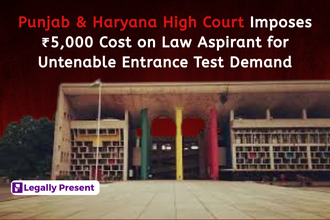In a landmark ruling aimed at curbing black money and promoting transparency in civil litigation, the Supreme Court of India has directed all civil courts to inform Income Tax (IT) authorities whenever a suit involves cash payments of ₹2 lakh or more. This decision was delivered in The Correspondence RBANMS Educational Institution v. B. Gunashekar & Another on April 16, 2025, by a Division Bench comprising Justices JB Pardiwala and R Mahadevan.
This verdict not only reinforces the significance of Section 269ST of the Income Tax Act, 1961, but also underscores the judiciary’s commitment to deterring frivolous property litigation that lacks legal basis and promotes speculative claims.
Case Background: Dispute Over Long-Held Charitable Property
The case stemmed from a dispute involving RBANMS Educational Institution, a public charitable trust in Bangalore that has been serving marginalized communities since 1873. The trust was granted leasehold rights to a parcel of land in 1905, formally conveyed in 1929. It has held undisputed possession of this land for over a century, using it for educational purposes.
In 2018, respondents filed a civil suit seeking a permanent injunction against RBANMS, based on an agreement to sell the property for ₹9 crore, including a ₹75 lakh cash payment. However, this agreement was executed by third parties with no connection to RBANMS. The respondents had no legal title or relationship with the trust and yet attempted to claim rights based on this agreement.
Trial and High Court Proceedings
RBANMS moved an application under Order VII Rule 11(a) and (d) CPC for rejection of the plaint on the ground that:
- The respondents had no privity or legal relationship with the trust;
- An agreement to sell does not transfer ownership or create enforceable interest under Section 54 of the Transfer of Property Act, 1882.
The trial court dismissed this application. Although the High Court initially directed reconsideration, the trial court once again rejected it. The High Court upheld this decision, leading RBANMS to appeal before the Supreme Court.
Supreme Court’s Findings: No Privity, No Case
The Supreme Court allowed the appeal, emphasizing that:
“There is no privity between the respondents and the appellant. The agreement to sell is not between the parties to the suit. As per Section 7 of the Transfer of Property Act, only the owner or an authorized person can transfer property.”
The Court observed that speculative litigation of this nature:
- Abuses the judicial process;
- Threatens public interest and charitable initiatives;
- Creates confusion over property rights based on unauthorized third-party agreements.
Thus, the Court ordered the rejection of the plaint under Order VII Rule 11 CPC.
Cash Payment Flagged: SC Invokes Section 269ST of Income Tax Act
A pivotal aspect of this judgment was the serious concern over the ₹75 lakh cash payment made in the transaction. The Court flagged the potential violation of Section 269ST of the Income Tax Act, which:
- Prohibits receipt of cash above ₹2 lakh in a single transaction;
- Imposes an equal amount of penalty under Section 271DA for violations;
- Places onus on the recipient to comply, and on parties to disclose the source of funds.
Key Supreme Court Directions: Mandatory Intimation to Income Tax Authorities
In a significant move, the Supreme Court issued the following binding directions to courts and sub-registrars:
- Civil Suit Disclosures:
- If a suit claims cash payment of ₹2 lakh or more, the court must inform the jurisdictional IT department to examine potential violation of Section 269ST.
- Sub-Registrar’s Duty:
- If a property registration document shows cash payments of ₹2 lakh or more, the sub-registrar must inform the IT authority.
- Disciplinary Measures:
- If any IT authority finds that a registering officer failed to report such a transaction, it must inform the Chief Secretary of the State/UT for appropriate disciplinary action.
- Due Process by IT Department:
- Upon receiving information, IT authorities must act in accordance with the law, ensuring transparency and accountability.
These directions create a compliance mechanism that integrates the Income Tax Act with civil and property litigation, ensuring better scrutiny of suspicious cash transactions.
Legal and Policy Implications
This judgment reinforces:
- Digitalization of financial transactions;
- The State’s anti-black money policy;
- The need for institutional accountability in land and property transactions.
It strengthens judicial discipline by encouraging trial courts to examine whether a plaint is legally maintainable—especially when founded on an agreement not involving the parties.
Furthermore, it promotes inter-departmental coordination between the judiciary, IT department, and property registration authorities to plug legal and financial loopholes.
A Caution Against Speculative Litigation
The Court also issued a stern warning against speculative litigation that misuses the legal system to harass rightful landholders or charitable bodies. It stated that:
“Permitting such litigation will obstruct the functioning of institutions meant for public welfare and create confusion over title to immovable properties.”
Conclusion
The Supreme Court’s verdict in RBANMS Educational Institution v. B. Gunashekar sets a progressive precedent in real estate law, judicial ethics, and financial transparency. By mandating reporting of high-value cash payments in civil suits and property registrations, the judgment takes a firm stand against black money, benami deals, and fraudulent property claims.
It also restores faith in the judiciary’s role as a gatekeeper that filters out baseless litigation and protects genuine institutions from harassment.
With this judgment, India takes a significant step forward in its pursuit of a cleaner, more accountable digital economy.


